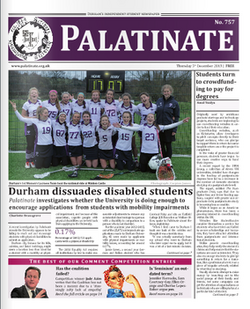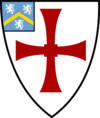Palatinate (newspaper)
54°46′24″N 1°34′18″W / 54.77333°N 1.57167°W
 Front page from the 5 December 2013 | |
| Type | Fortnightly newspaper |
|---|---|
| Format | Berliner |
| Owner(s) | Durham Students' Union |
| Publisher | Durham Students' Union |
| Editor | Alexandra Cupples & Josh Smith |
| Founded | 1948 |
| Headquarters | Dunelm House, Durham |
| Website | www |
Palatinate is the award-winning official student newspaper of Durham University and is one of Britain's oldest and best-known student publications, having celebrated its 60th anniversary in 2008.[1][2] The paper was named NUS/Independent Student Newspaper of the Year in 2001.[3][4][5]
The name of the newspaper derives from the colour Palatinate, a shade of purple closely associated with the university and derived from County Durham's political history as a County Palatine.
Details
This section possibly contains original research. (February 2011) |
Palatinate is published on a fortnightly basis during term time, and its editors-in-chief are elected on a per-term basis. Although the Durham Students Union technically subsidises the paper, revenues from advertising are greater than the cost of production, ensuring that the publication is profitable.[citation needed] The paper reports news about Durham University and its sporting activities in addition to publishing local news, arts coverage, and a variety of features and a comment section. Since 2004, Palatinate has been freely available and is now distrubuted to a variety of locations across the main university campus.[citation needed] Also, since 2007, the publication has been made available online.[citation needed] Queen's Campus in Stockton-on-Tees also receives copies. Each edition is also printed in full color.
History
Beginnings (1946-1999)
The first ever issue of the student newspaper was published in 1948, then 51 years later, in 1999, Palatinate was named runner-up in the Student Newspaper of the Year category of the Guardian Student Media Awards.[6]
Growth (1999-2004)
From 2001 through 2004, which was three academic years, Palatinate was published in broadsheet format, later reverting back to the current tabloid format. [citation needed] During those three years, in 2001, Palatinate was named the NUS/The Independent Student Newspaper of the Year.[3][4][5] Later, in 2003, reporter Oliver Brown was runner-up for the Best Student Reporter category of the NUS National Student Media Awards.[7]
In January 2004, Palatinate became a free publication. This was achieved by greatly increasing circulation, which drew along more advertising revenue. In October of the same year, the paper changed from the newer broadsheet to a brand new tabloid format, with the changes being overseen by Tim Roach and Christopher Lamb. [citation needed]
Major Changes (2005-2007)
In 2005, under Lamb's editorship, the paper stopped receiving direct funding from the Students' Union, resulting in an increase of advertising needed. The Students' Union, however, still provides Palatinate with office space and computing facilities. Later, in 2007, the Palatinate received a brand new website. The style and function of the website is similar to that of the The Guardian and the The Time national newspapers.
Expansion (2008-2015)
In June 2008, content from Palatinate was showcased in the inaugural issue of FS magazine as an example of "the best of student journalism." In November of the same year, under co-editorship of Max Farookhi and Emily Pursed, Palatinate launched Indigo, an arts and features pull-out supplement. The newspaper also upgraded to an unusually thick, sheer white paper type for printing purposes and celebrated its 700th edition. In June 2009, under the editorship of James Thompson, Palatinate launched a new Careers section geared towards helping students navigate through the graduate job market. [citation needed] The newspaper also underwent a slight re-design. Then, in January 2010, under the co-editorship of Liza Miller and Vincent McAviney, Indigo was relaunched, a new sports supplement titled "The Locker Room" was launched, and the main paper was upgraded from tabloid to Berliner size. [citation needed] Later, in October, under the co-editorship of Ally Bacon and Matt Richardson, a new approach, PalatinateTV was launched. [citation needed]
Later, in March 2013, under the co-editorship of Harriet Line and Florence Snead, a Science and Technology section was launched online and printed in the bumper 750th Celebratory Edition. Also, Indigo was redesigned by Indigo editors Robin Marshall and Justina Crabtree, to a three-column format (instead of the traditional five) with a more artistic appearance. About a little more than a year and a half later, under the co-editorship of Christopher Somers and Tom Fenton, Palatinate launched a Profile section. Since December 2014, journalists from the newspaper have interviewed people such as Natalie Bennett, The Ting Tings, David Blunkett, Edwina Currie, Moazzam Begg, Owen Jones, Esther Rantzen and Norman Baker. [citation needed]
Most recently, in November 2015, under co-editorship of Henry Clare and Josh Smith, the newer Palatinate website received a newer and slicker, more friendly interfaces, along with the digitisation of each Palatinate issue was arranged. [citation needed]
Past Editors-in-Chief
Notable former Editors-in-Chief of Palatinate include George Alagiah,[1] Hunter Davies,[8] Piers Merchant, Timothy Laurence,[9] Jeremy Vine,[1] Tim Burt[10] and Harold Evans.[1]
- Easter Term 2015: Tom Fenton and Henry Clare[11]
- Epiphany Term 2015: Tom Fenton and Christopher Somers[12]
- Michaelmas Term 2014: Justin Villamil and Christopher Somers[13]
- Easter Term 2014: Ben Hamer and Victoria Ferguson[14]
- Epiphany Term 2014: Ben Hamer and Victoria Ferguson[15]
- Michaelmas Term 2013: Ben Hamer and Jillian Ward[16]
- Easter Term 2013: Harriet Line and Jillian Ward[17]
- Epiphany Term 2013: Harriet Line and Florence Snead
- Michaelmas Term 2012: Charlie Taverner and Olivia Rudgard
- Easter Term 2012: Charlie Taverner and Larry Bartleet
- Epiphany Term 2012: Delaney Chambers and Hannah Shaddock
- Michaelmas Term 2011: Daniel Johnson and Hugh Anderson-Elliot[18]
- Easter Term 2011: Daniel Johnson and John Burn-Murdoch
- Epiphany Term 2011: Jack Battersby and Rosie Boscawen
- Michaelmas Term 2010: Ally Bacon and Matthew Richardson
- Easter Term 2010: Vincent McAviney and Jodie Smith
- Epiphany Term 2010: Vincent McAviney and Liza Miller
- Michaelmas Term 2009: Daniel Bjelis and Chris Wright
- Easter Term 2009: James Thompson
- Epiphany Term 2009: James Thompson
- Michaelmas Term 2008: Emily Purser and Maz Farookhi
- Epiphany Term 2008: Christopher Gribbin and Alice Hemsworth
- Michaelmas Term 2005: Ed Rose
- Easter Term 2002: Helen Brown
- Michaelmas Term 2002: Ed Mezzetti
- Epiphany Term 2001: Kitty Donaldson
- Michaelmas Term 1987: Aisling Irwin
- Easter Term 1987: Cristina Nicolotti Squires[19]
- Epiphany Term 1987: Cristina Nicolotti Squires[19]
- Michaelmas 1986: Clare Lyons
- Easter 1986: Wendy Pilmer
- Epiphany Term 1986: Jeremy Vine[20]
- Michaelmas Term 1985: Adrian Wells
- Easter Term 1985: Tim Burt
- Epiphany Term 1985: Tim Burt
- Michaelmas Term 1984: Joel Donovan[21]
- Easter Term 1984: Alastair McCall
- Epiphany Term 1984: Alastair McCall
- Michaelmas 1956: M. J. C. Eaves
- Easter 1956: L. Ellenor
- Epiphany 1956: D. J. Dyson
- Michaelmas 1955: J. M. Thew
- Easter 1955: A. P. Byrne
- Epiphany 1955: D. Gains
- Michaelmas 1954: R. G. Phillips
- Easter 1954: J. M. Munro
- Epiphany 1954: J. M. Munro
- Michaelmas 1953: J. Wells
- Easter 1953: J. Wells
- Epiphany 1953: J. T. Joyce
- Michaelmas 1952: R. A. Penfold
- Easter 1952: P. E. Hoyle
- Epiphany 1952: P. D. A. Campbell
- Michaelmas 1951: D. A. Reeder
- Easter 1951: P. G. Edwards[22]
- Epiphany 1951: H. M. Evans[23][24][25]
- Michaelmas 1950: Derek Harrison[26]
- Easter 1950: Derek Harrison[27]
- Epiphany 1950: E. K. T. Coles[28]
- Michaelmas 1949: E. K. T. Coles[29]
- Easter 1949: J. A. Gordon[30]
- Epiphany 1949: J. A. Gordon[31]
- Michaelmas 1948: J. E. H. Spaul[32]
- Easter 1948: L. W. George[33]
- Epiphany 1948: L. W. George and A. Burman[34]
References
- ^ a b c d "Future of student paper at risk". The Northern Echo. 7 June 2005. Retrieved 28 August 2007.
- ^ Andrew, Pierce (15 June 2005). "Pressing Problem". The Times. People with Andrew Pierce. UK. Retrieved 28 August 2007.
- ^ a b Sargeson, Nikki (20 October 2001). "Student journalists honoured". Holdthefrontpage.co.uk. Retrieved 28 August 2007.
- ^ a b Hodges, Lucy (28 October 2001). "Durham wins award for best student paper". The Independent. UK. Retrieved 28 August 2007. [dead link]
- ^ a b Hodges, Lucy (1 November 2001). "Education: Did they have some news for us?". The Independent. UK. Retrieved 28 August 2007. [dead link]
- ^ Carvel, John (26 October 1999). "Talent, flair and a new voice". The Guardian. UK. Retrieved 28 August 2007.
- ^ "York Vision does the double". Holdthefrontpage.co.uk. 25 November 2003. Retrieved 28 August 2007.
- ^ McGlone, Jackie (20 August 2006). "A life in the day of Hunter Davies". Scotland on Sunday. Retrieved 28 August 2007.
- ^ Qualtrough, Stuart (23 May 1999). "People's Prince Will's may go to Durham University". Sunday Mirror. Retrieved 28 August 2007.
- ^ Tim Burt today
- ^ "Issue 774". Retrieved 12 October 2015.
- ^ "Issue 769". Retrieved 12 October 2015.
- ^ "Issue 765". Retrieved 12 October 2015.
- ^ "Issue 763". Retrieved 12 October 2015.
- ^ "Issue 760". Retrieved 12 October 2015.
- ^ "Issue 756". Retrieved 12 October 2015.
- ^ "Issue 572". Retrieved 12 October 2015.
- ^ Fazackerley, Anna. "Freedom of the press? Not for student newspapers". the Guardian. Retrieved 13 October 2015.
- ^ a b O'Conor, Lottie (19 March 2014). "10 minutes with: News editor Cristina Nicolotti Squires". The Guardian.
{{cite news}}:|access-date=requires|url=(help) - ^ Sale, Jonathan (23 October 2011). "Passed/Failed: An education in the life of broadcaster Jeremy Vine". The Independent. Retrieved 13 October 2015.
- ^ "Joel Donovan QC". www.cloisters.com. Retrieved 13 October 2015.
- ^ "Issue 38". Retrieved 12 October 2015.
- ^ "Issue 33". Retrieved 12 October 2015.
- ^ "Journalist Sir Harold Evans gives lecture". Retrieved 13 October 2015.
- ^ Evans, Harold (2009). My Paper Chase: True Stories of Vanished Times. Hachette. Retrieved 13 October 2015.
- ^ "Issue 29". Retrieved 12 October 2015.
- ^ "Issue 27". Retrieved 12 October 2015.
- ^ "Issue 21". Retrieved 12 October 2015.
- ^ "Issue 17". Retrieved 12 October 2015.
- ^ "Issue 15". Retrieved 12 October 2015.
- ^ "Issue 9". Retrieved 12 October 2015.
- ^ "Issue 5". Retrieved 12 October 2015.
- ^ "Issue 4". Retrieved 12 October 2015.
- ^ "Issue 1". Retrieved 12 October 2015.

